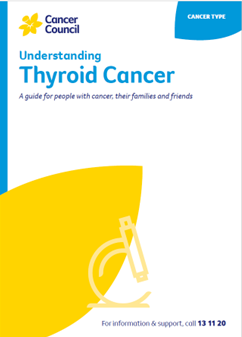- Home
- Thyroid cancer
- Treatment
- Radioactive iodine treatment
- Side effects of RAI treatment
Side effects of RAI treatment
Usually, being temporarily radioactive is the only major side effect of having RAI treatment. Drinking lots of water will help the radiation to pass out of your body faster and also reduce your bladder’s exposure to radiation.
Because the salivary glands may absorb some iodine, you might have a dry mouth as well as taste and smell changes for a few weeks after treatment. Sometimes you may have dry or watery eyes.
Some people will have ongoing problems with swelling and pain in their salivary glands. Ask your treatment team for medicines (e.g. paracetamol) to relieve swelling and pain.
Other side effects, such as tiredness, are often caused by thyroid hormone withdrawal, but will improve when your thyroid hormone levels return to normal. Nausea is rarely a side effect, but if it happens there is medicine to help.
Fertility and treatment for thyroid cancer
Many people diagnosed with thyroid cancer are under 40 and may be concerned about how the treatment will affect their ability to conceive a child. Fertility usually is not permanently affected by surgery or RAI treatment. If you or your partner want to have a baby after RAI treatment, talk to your doctor.
In the short term, it is recommended that you delay pregnancy for 6 months after treatment. This is because RAI may have a short-term effect on eggs and sperm, so you’ll be advised to use contraception for a set amount of time. Women also need to check that their thyroid hormone levels are normal before trying to get pregnant. Talk about this timing with your doctor.
→ READ MORE: Targeted therapy for thyroid cancer
Podcast: Coping with a cancer diagnosis
Listen to more of our podcast for people affected by cancer
More resources
A/Prof Diana Learoyd, Endocrinologist, GenesisCare North Shore, Faculty of Medicine and Health, University of Sydney, NSW; Emeritus Professor Leigh Delbridge AM, The University of Sydney, Thyroid Surgeon, The Mater and North Shore Private Hospitals, NSW; Prof Ruta Gupta, Tissue Pathology and Diagnostic Oncology, Royal Prince Alfred Hospital and The University of Sydney, NSW; Susan Leonard, Cancer Nurse Coordinator Thyroid and Brachytherapy, Cancer Care Services, Royal Brisbane and Women’s Hospital, QLD; Dr Dean Lisewski, Endocrine and General Surgeon, Fiona Stanley Hospital and St John of God Hospital, Murdoch, WA; Caitriona Nienaber, 13 11 20 Consultant, Cancer Council WA; Jonathan Park, Consumer; A/Prof David Pattison, Deputy Director and Senior Staff Specialist, Department of Nuclear Medicine and Specialised PET Services, Royal Brisbane and Women’s Hospital and School of Medicine, University of Queensland, QLD; Prof Bruce Robinson, Endocrinologist, Co-Head, Cancer Genetics, Kolling Institute of Medical Research, The University of Sydney and Royal North Shore Hospital, NSW; Marissa Ryan, Team Leader (Cancer) Pharmacist, Princess Alexandra Hospital, Brisbane, QLD
View the Cancer Council NSW editorial policy.
View all publications or call 13 11 20 for free printed copies.
Need to talk?
Support services
Coping with cancer?
Ask a health professional or someone who’s been there, or find a support group or forum
Online Community
Check out this supportive online community for people affected by cancer
Cancer information
Making cancer treatment decisions
Decision-making steps, consent and second opinions
Where to find clinical trials
Links to information about current clinical trials of new therapies
